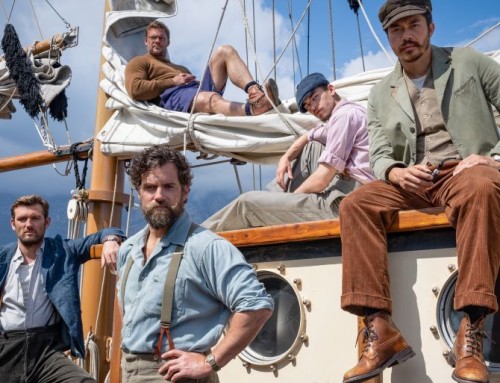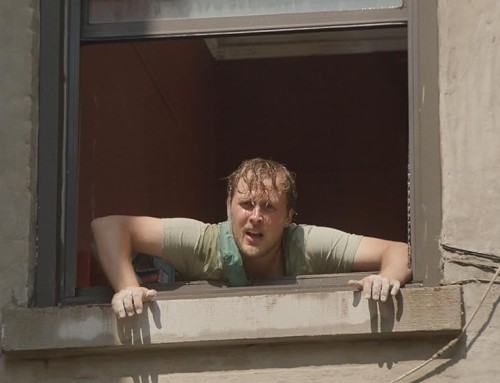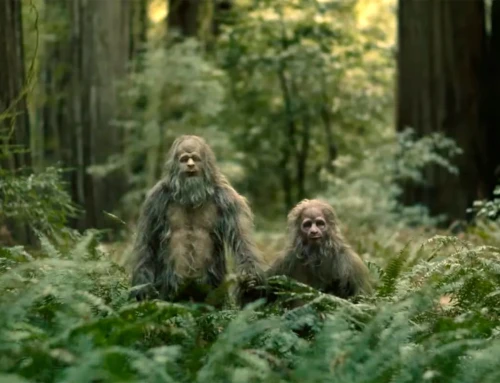After making a big splash with both critics and audiences with his directorial debut “The Witch”, writer/director Robert Eggers has returned with the anticipated nautical nightmare, “The Lighthouse”.

Eggers once again plays with the psychology of the characters, leaving much of what happens on screen up to your interpretation. As we follow these two men, it becomes evident early on that we’re witnessing a psychological descent into madness, very similar to “The Shining”. Pattinson’s Winslow begins to have severe hallucinations of a sultry Mermaid, something moving around at the top of the Lighthouse and is endlessly tormented by a seagull that seemingly stalks his every move.
Even when you think you know where the story is going, Eggers and co-writer Max Eggers (his brother) effectively twists the story around, keeping things fresh and surprising. Dafoe’s Wake tells tales of mysticism and superstition and “The Lighthouse” actually plays out like one of those sea shanties. The screenplay juggles an assortment of themes that tackle identity, repressed desires, past sins and masculinity; all with a searing confidence and clarity.
The craftsmanship on display is downright astonishing. Robert Eggers further proves himself a cinematic force to be reckoned with. His command over every aspect of this film is first rate. Although the script is filled with thick, heavy dialogue, Eggers’ visual eye is so compelling, you could watch the film with the sound off and still be able to follow along.
“The Lighthouse” is without question one of the finest looking films all year. The unique visual aesthetic feels so authentic, you never feel like you’re watching a film made in the year 2019. The gothic setting along with immaculate production detail and awe-inducing cinematography by Jarin Blaschke create an environment that feels absorbing and tactile. The wet, dreary landscape begins to take its toll on the characters and we as audience members can practically feel the surroundings ourselves. The claustrophobic 1:19:1 aspect ratio makes us feels like we’re trapped in the decayed minds of the characters, leading the eerie atmosphere to fully grasp the viewer.

Dafoe and Pattinson give two of the best performances you’ll see all year. Both actors are giving their all, while delivering nuanced performances that help further develop their respective characters. Dafoe, looking like an even more crazed version of Lon Cheney Jr’s Wolfman, is giving some of his most vibrant and manic work to date. Wake’s thick, Captain Ahab-esque accent is extremely in-your-face, but thanks in part to the writing and Dafoe’s magnetic performance, the character never feels cartoonish, but rather grounded. Pattinson, continuing his run as one of the most diverse actors around, gives an exceptional performance here. Winslow is the more quiet, reserved character of the two, but throughout the film, his layers slowly peel back, revealing more details and further depth. There’s a savage intensity between the two characters that is absolutely stunning to witness. The scenes of the two men bickering and fighting feels like a demented mix between “12 Angry Men” and “Step Brothers”.
“The Lighthouse” is impeccably layered and dense, that it works on multiple levels. Perhaps most surprising of all, it works exceptionally well as a black comedy. To say what some of the biggest laughs are would give away spoilers, but one particular scene involving a Seagull is the type of humor that will make you laugh out loud, then gasp in horror at what you just laughed at. The sound design particularly helps in making some of the crazier moments even more effective.
The brilliant score by Mark Korven utilizes the setting perfectly and doesn’t feel so much like a film score, but like the films pulse. The editing by Louise Ford is another shining aspect of the film. “The Lighthouse” moves at its own pace, sometimes slowly and sometimes quickly, but it always feels like it’s moving at the right speed. This is a hypnotic, surreal trip of unhinged madness and that trip surely has its ups and downs. Each story beat is carefully plotted and given time to grow, that character decisions and turns in the plot all feel organic and properly developed.

“The Lighthouse” is one of the most unique films to arrive to theaters in years and it’s one of the absolute best. The conversations you’re bound to have after watching the film are sure to be nearly as rewarding as the actual film. The subtle details and the characters and plot will lead to immensely gratifying rewatches down the road.
Despite just two films in his repertoire, Robert Eggers solidifies himself as one of American cinemas most unique and original voices. With a gifted hand in storytelling and a visual eye unlike most, Eggers is sure to become one of the essential filmmakers of this era.








Certainly up there with 3 Faces, Climax, The Wild Pear Tree, Ash is Purest White, Parasite, Once Upon a Time in Hollywood, Diane, Passolini, The Beach Bum, The Souvinir, and Black Mother as the best of the year. Eggers The Witch was solid, but with this one he showed so much maturity and growth.
The hype is real. Dafoe and Pattinson are incredible. Robert Eggers’ writing and direction is the real deal, like Hitchcock on acid. Cinamatography is beautiful. Loved it.
There was some images that left me feeling very impressed, while others left me laughing with just how silly they were. The ending was very suspenseful though as it made me lean over my seat. I loved the aspect ratio ss well.
An entrancing, dream-like film with two of the finest performances of the year.
I want to see this film so bad!
This movie is crazy and wonderful!
“The Lighthouse” provided incredible performances from Willem Dafoe and Robert Pattinson. It contained beautiful art house shots and surreal Ingmar Bergman and Feliniesque moments. If you are in the mood to see an extremely dark bro comedy about 2 extra salty alcoholic lighthouse keepers dancing with eachother at the edge of sanity in the 1890’s, this would be the film for you. I honestly felt as if I was watching a silent era film from, the 1920’s yet with dialogue and an ethereal and stark soundtrack. This film was shot in black and white, contains adult themes and a psychotic mermaid. 2 thumbs up.
By far my favorite of the year, I absolutely loved it.
Amazing review!
Really makes me want to watch it!
Magnificent goods from you, man. I’ve understand your stuff previous to and you’re just extremely magnificent.
I actually like what you’ve acquired here, certainly like what you’re
saying and the way in which you say it. You make it entertaining and you still care for to keep it wise.
I can not wait to read much more from you. This is actually a great web
site.
372211 545599When I initially commented I clicked the -Notify me when new comments are added- checkbox and now each time a remark is added I get four emails with exactly the same comment. Is there any manner you possibly can take away me from that service? Thanks! 278179
656672 201875I got what you intend, saved to my bookmarks , very decent website . 929134
A motivating discussion is definitely worth comment.
I do think that you should publish more on this issue, it might not be a taboo matter but usually folks
don’t discuss such topics. To the next! Many thanks!!
adreamoftrains best web hosting
942482 350750Ich kenne einige Leute, die aus Kanadakommen. Eines Tages werde ich auch dorthin reisen Lg Daniela 296549
My spouse and I stumbled over here by a different page and thought I should check things out.
I like what I see so now i’m following you. Look forward to checking out your web page for a second
time.
529147 350593Hey, you used to write wonderful, but the last couple of posts have been kinda boring I miss your tremendous writings. Past few posts are just a bit out of track! come on! 380944
It’s going to be ending of mine day, except before ending I
am reading this wonderful post to improve my know-how.
Great beat ! I would like to apprentice while you amend your web site, how
could i subscribe for a blog web site? The account
aided me a acceptable deal. I had been tiny bit acquainted of this your broadcast
provided bright clear idea
If you want to increase your knowledge just
keep visiting this site and be updated with the most recent news update posted here.
Terrific article! That is the type of info that
are meant to be shared across the net. Shame on the seek engines
for now not positioning this publish higher! Come on over and consult with my
website . Thank you =)
Howdy! Someone in my Myspace group shared this website with us so I came to give it
a look. I’m definitely enjoying the information. I’m book-marking and will be tweeting this to my followers!
Fantastic blog and brilliant design.
Just desire to say your article is as astounding.
The clarity in your post is just nice and i can assume you’re an expert on this subject.
Well with your permission let me to grab your RSS feed to keep
up to date with forthcoming post. Thanks a million and please
continue the rewarding work.
Great information. Lucky me I ran across your site by accident (stumbleupon).
I’ve saved as a favorite for later!
I love your blog.. very nice colors & theme. Did you create this website yourself or did you hire someone to do it for you?
Plz respond as I’m looking to create my own blog and would like to know where u got this
from. appreciate it
Wow, this piece of writing is nice, my sister is analyzing these things, thus I am
going to tell her.
Howdy! I could have sworn I’ve visited this web site before
but after looking at a few of the articles I realized it’s new to me.
Regardless, I’m definitely happy I found it and I’ll be book-marking it and checking back regularly!
Every weekend i used to go to see this web site, for the reason that i wish for enjoyment, since this this
web site conations really good funny data too.
Excellent blog here! Also your website loads up fast!
What web host are you using? Can I get your affiliate
link to your host? I wish my website loaded up as quickly as yours lol
When Walter Brennan connives to help a male he knows
nothing about cheat at a poker game, somebody asks him
what he would have gained from smashing the rules.
As the famous Kenny Rogers song says “you have to find out when you ought to hold’em, know when you should fold’em, know when you should walk away. If I’m never totally willing to complete this with the poker-online table, I better choose tournaments.
I like the helpful info you supply on your articles. I’ll bookmark
your blog and test again right here frequently. I am reasonably
sure I’ll learn many new stuff proper right here! Best of luck for the following!
I got this website from my pal who shared with me concerning this site and now this time I am
browsing this web page and reading very informative content at
this place.
This is the right blog for anyone who really wants to find out about this topic.
You understand so much its almost tough to argue with you
(not that I really would want to…HaHa). You definitely put a brand new spin on a subject
which has been written about for a long time. Excellent stuff, just excellent!
What’s up, yeah this article is actually pleasant and
I have learned lot of things from it concerning blogging.
thanks.
Hey! Do you know if they make any plugins
to assist with Search Engine Optimization? I’m trying to get my blog to rank for some targeted keywords but I’m not seeing very good results.
If you know of any please share. Thank you!
It is appropriate time to make some plans for the longer term and it is time to be happy.
I have read this submit and if I may just I wish to counsel you some fascinating issues or advice.
Maybe you could write subsequent articles referring to this article.
I want to read even more things about it!
Spot on with this write-up, I really believe that this site needs a great deal more attention. I’ll probably be returning to read through more, thanks for the info!|
Thanks for finally writing about > %blog_title% < Liked it!|
Needed to compose you a very small remark just to thank you so much once again relating to the splendid knowledge you’ve featured above. This has been quite extremely generous of you giving extensively all a number of us could have sold for an electronic book in making some dough for their own end, primarily given that you could possibly have done it if you wanted. The thoughts in addition worked as the great way to fully grasp that some people have the identical eagerness like my personal own to understand great deal more pertaining to this problem. I believe there are thousands of more pleasurable opportunities in the future for those who looked over your site.
Hey I am so excited I found your web site, I really found you
by error, while I was searching on Aol for something else, Anyways I am here now and would just like to say thanks a lot for a remarkable post and a all
round exciting blog (I also love the theme/design), I don’t have time to go through it
all at the minute but I have book-marked it and also added in your RSS feeds, so when I have time I will be back to read
a great deal more, Please do keep up the fantastic jo.
I visited several web sites but the audio quality for audio songs existing at this site is really fabulous.
What a stuff of un-ambiguity and preserveness of precious know-how about unexpected feelings.
Thanks for sharing your thoughts on 먹튀검증업체.
Regards
To the defactofilmreviews.com webmaster, Your posts are always informative and well-explained.
Hello defactofilmreviews.com webmaster, Thanks for the detailed post!
Dear defactofilmreviews.com administrator, Your posts are always well-referenced and credible.
Hello defactofilmreviews.com owner, Your posts are always insightful and valuable.
Hi defactofilmreviews.com owner, Your posts are always well researched.
Dear defactofilmreviews.com owner, Your posts are always well-structured and logical.
To the defactofilmreviews.com owner, Good job!
Hello defactofilmreviews.com webmaster, Your posts are always well-formatted and easy to read.
Hi defactofilmreviews.com administrator, Your posts are always well received by the community.
To the defactofilmreviews.com administrator, Thanks for the comprehensive post!
Hi defactofilmreviews.com administrator, Well done!
Hi defactofilmreviews.com owner, Thanks for the informative and well-written post!
Hi defactofilmreviews.com owner, Great content!
Hi defactofilmreviews.com administrator, Your posts are always interesting.
Hello defactofilmreviews.com administrator, Great job!